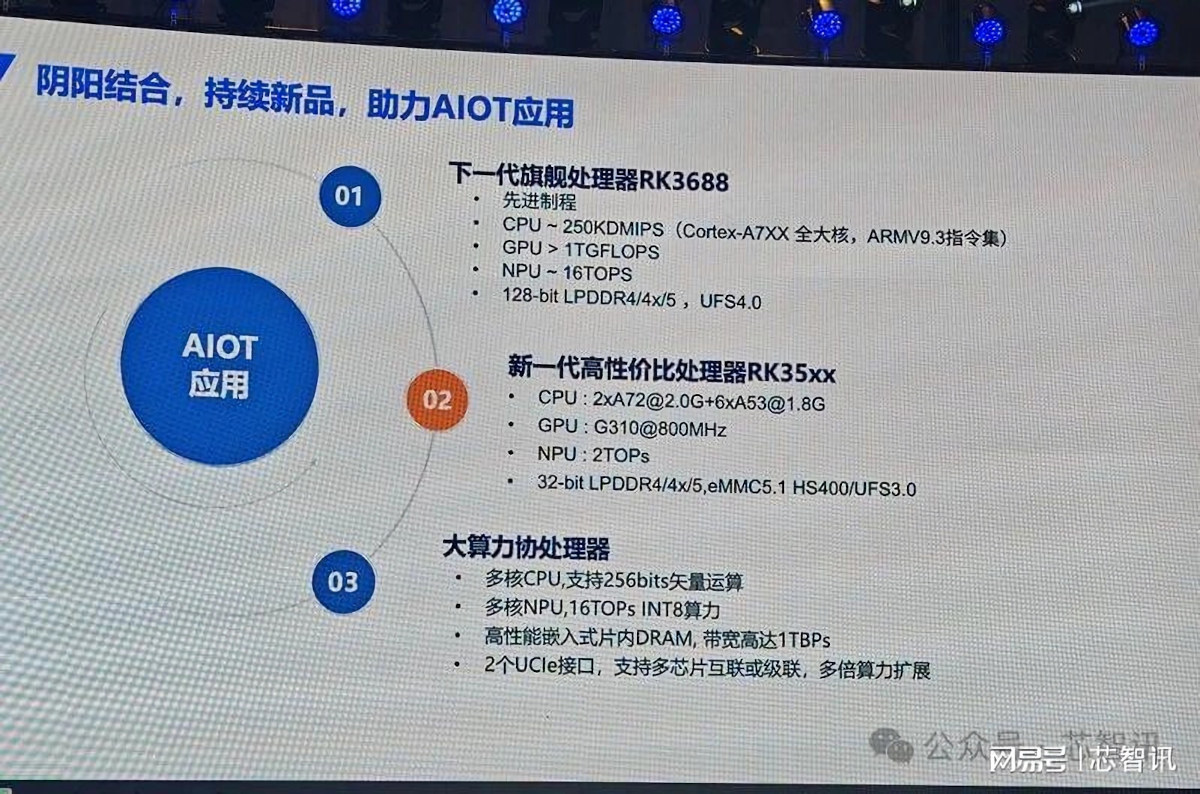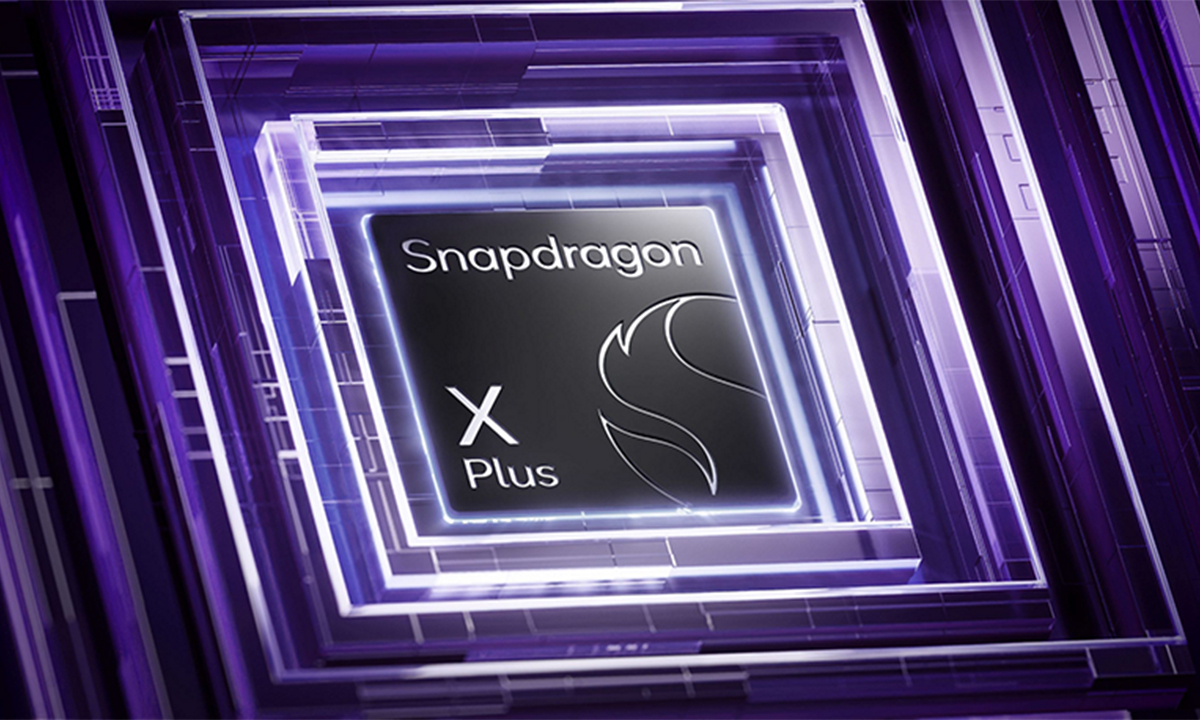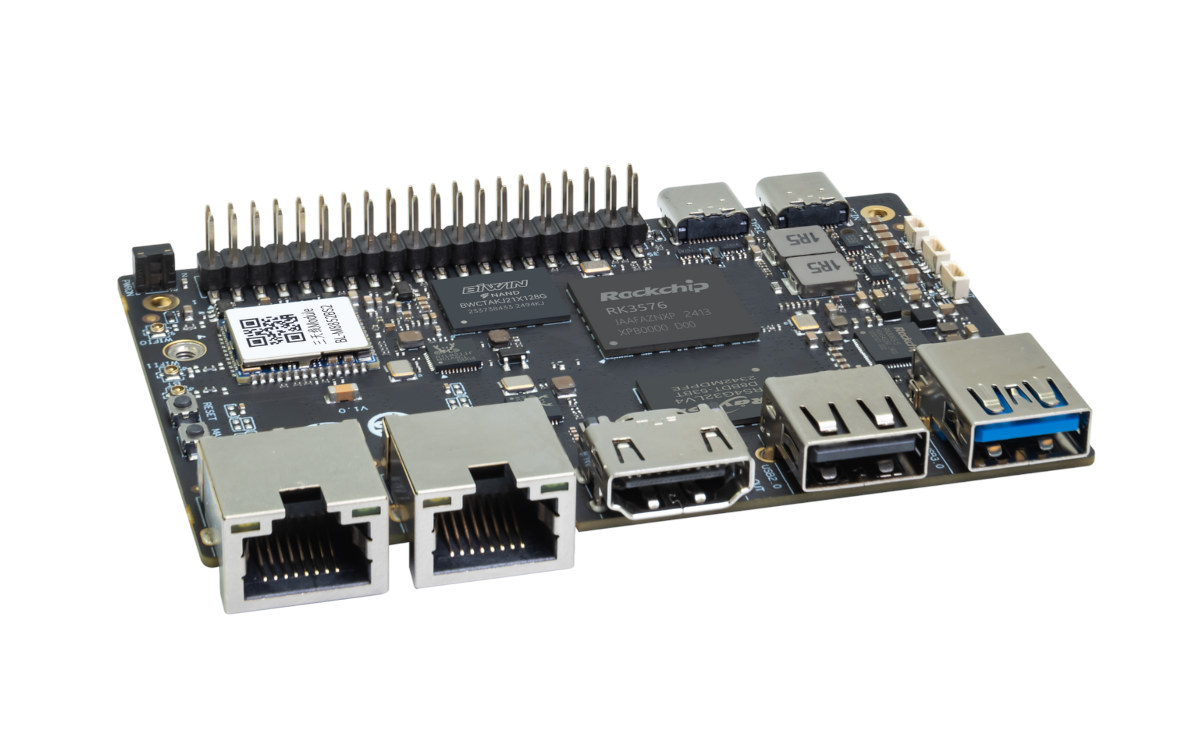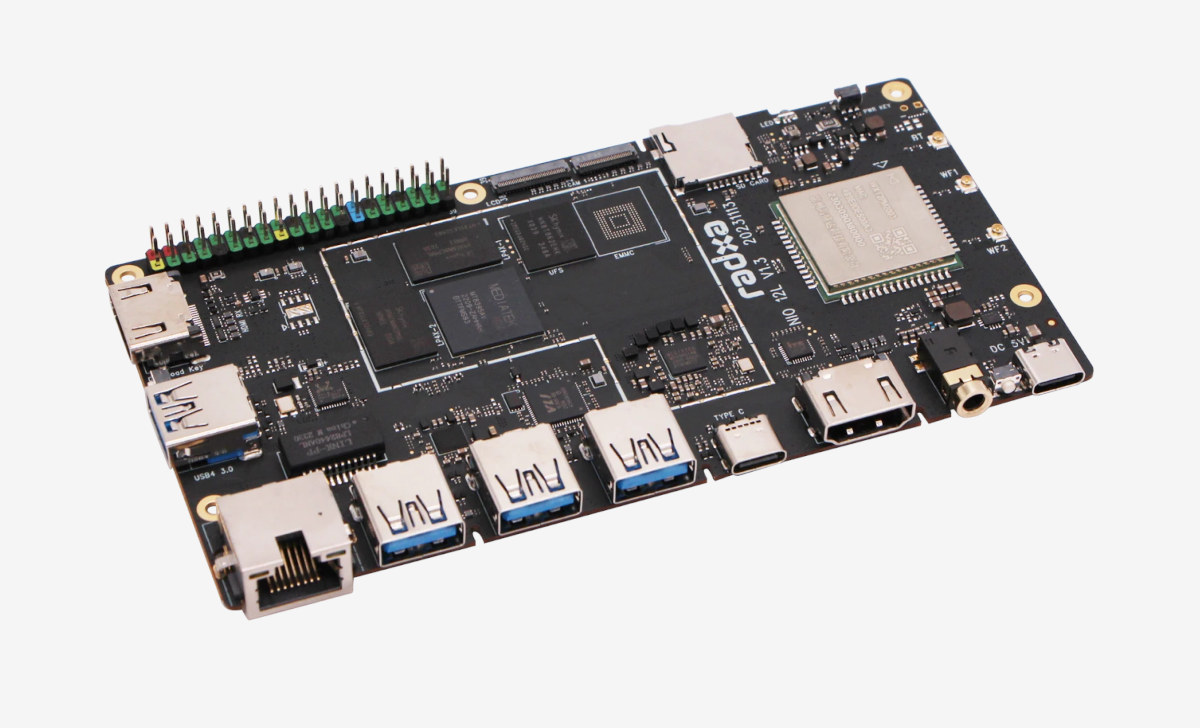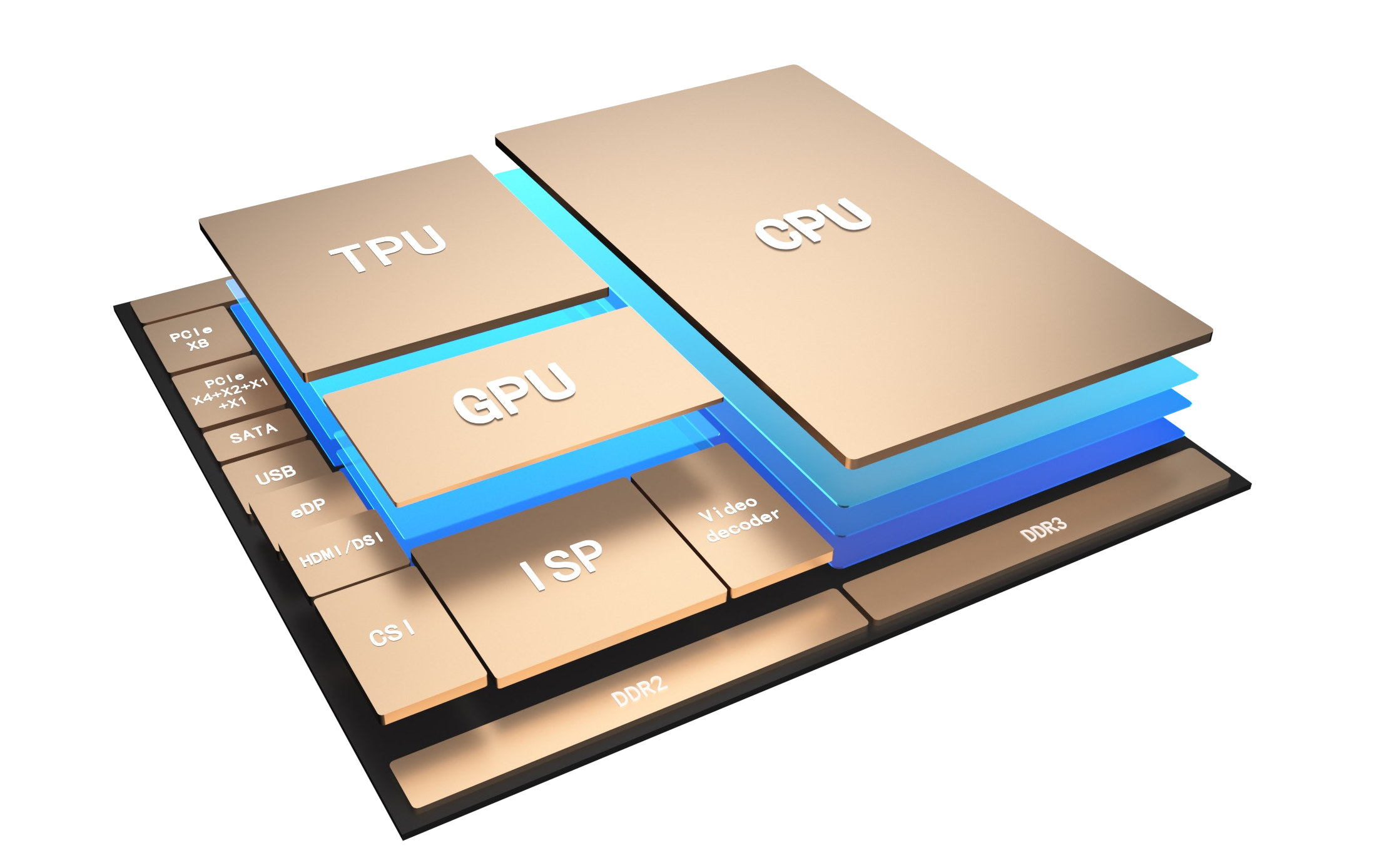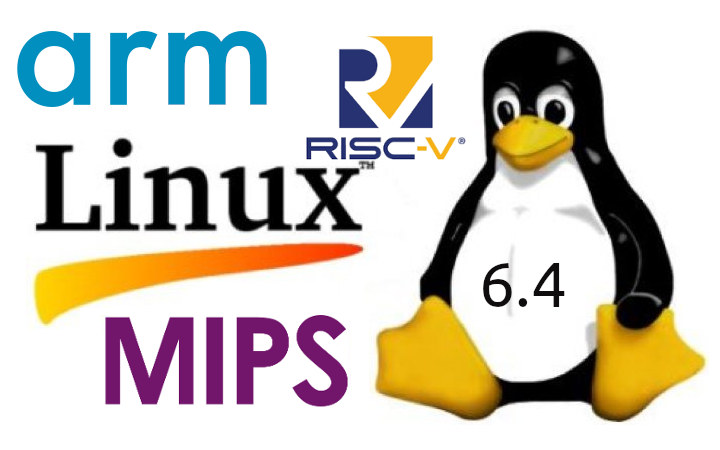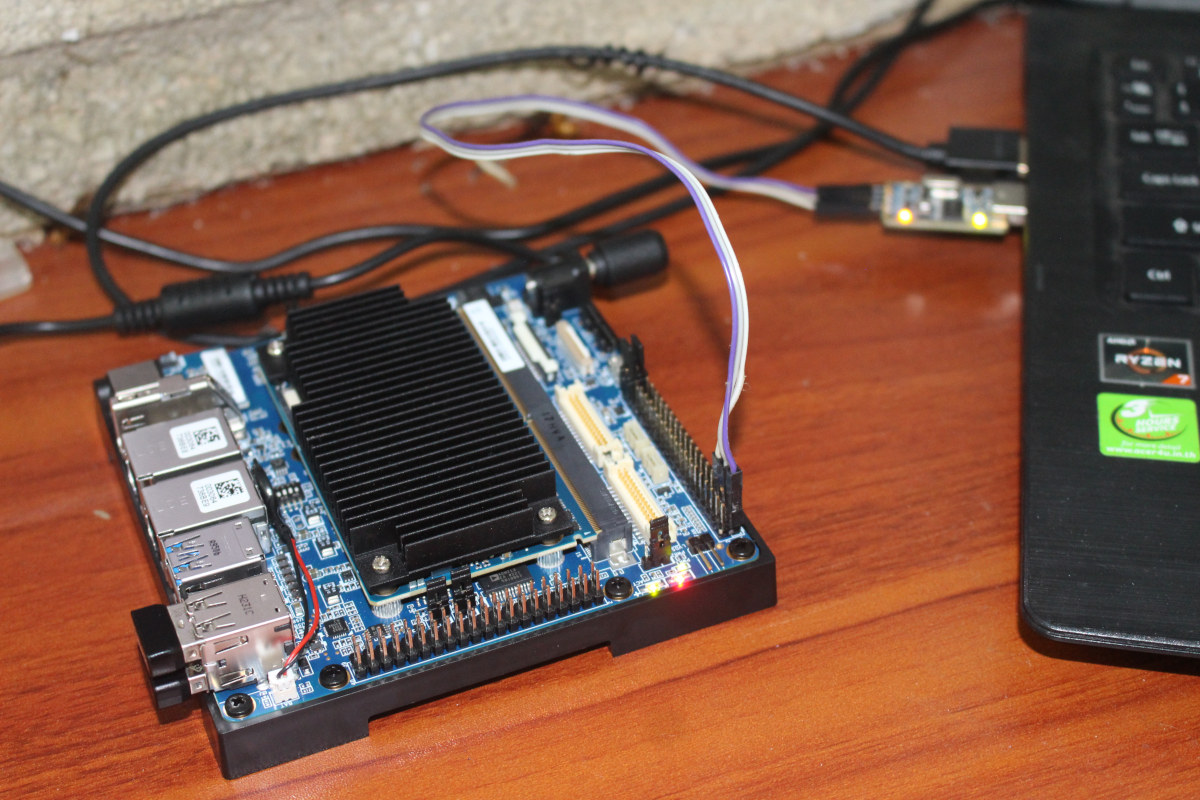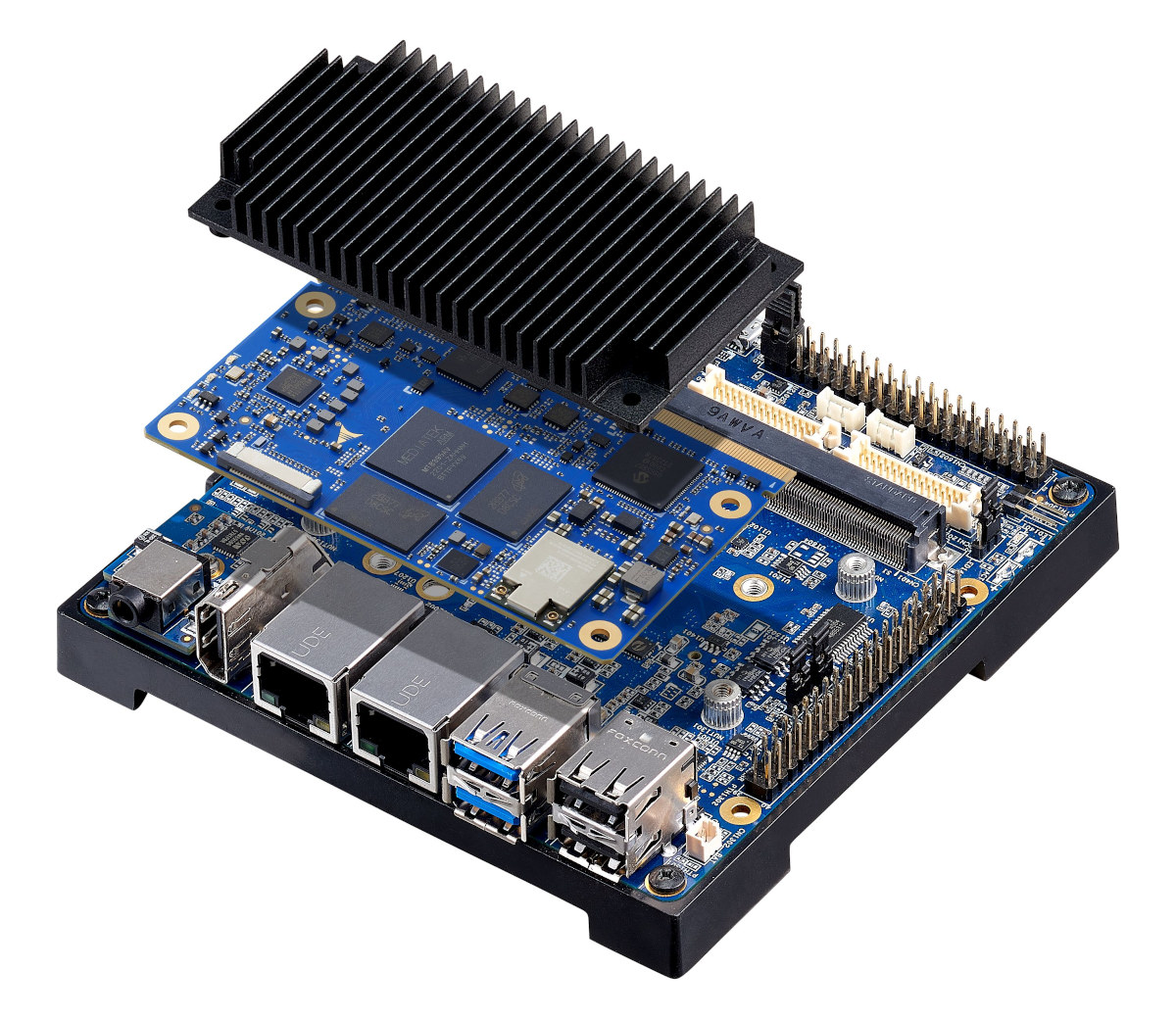Rockchip has unveiled the RK3688 AIoT SoC with Armv9.3 Cortex-A7xx cores delivering up to 250K DMIPS (RK3588 delivers 93K DMIPS), a 1 TFLOPS GPU, and a 16 TOPS NPU. The new processor succeeds the Rockchip RK3588 octa-core Cortex-A76/A55 first announced in 2019, and also features a 128-bit LPDDR4/4x/5 memory interface, and a UFS 4.0 storage interface. That’s about all we know about the RK3688 right now, but we can also deduct it’s probably based on a new, yet-to-be-announced Arm Cortex-A7xx core, possibly named Cortex-A730 or Cortex-A735, because no Arm cores have been announced with the Armv9.3 architectures. The Arm Cortex-A725 CPU core unveiled last May still relies on Armv9.2, and I’d expect new Arm cores to be introduced within the next few months unless Rockchip made a mistake in the presentation slide above. Two other platforms were also announced at the same time starting with a new entry-level/mid-range RK35XX octa-core […]
Qualcomm Snapdragon X Plus 8-core – A 4 GHz octa-core processor for entry-level Copilot+ PCs and laptops
Qualcomm’s Snapdragon X line of ARM-based processors is designed for Windows laptops, offering CPUs capable of competing with Intel and AMD processors. The Snapdragon X Plus (10 core) and Snapdragon X Elite, announced last year, include high-performance NPUs for AI processing. Qualcomm has now introduced the entry-level Snapdragon X Plus 8-core processor, targeting the $700 to $900 laptop market instead of the ~$1,300+ asked for something like the Microsoft Surface Laptop 15. It reduces CPU and graphics performance while maintaining the same AI features as the higher-end models. The Qualcomm Snapdragon X Plus lineup includes two octa-core processors: the X1P-46-100 and X1P-42-100, both built on a 4nm process. These processors come with eight Oryon CPU cores, clocked at 4GHz and 3.4GHz respectively, and are equipped with the Qualcomm Hexagon NPU, delivering 45 TOPS for AI tasks like Copilot+ PC. They also integrate Qualcomm Adreno GPUs offering 2.1 TFLOPS for the […]
Banana Pi BPI-M5 Pro low-profile SBC features Rockchip RK3576 octa-core Cortex-A72/A53 AIoT SoC
Banana Pi BPI-M5 Pro, also known as Armsom Sige5, is a low-profile single board computer (SBC) powered by the Rockchip RK3576 octa-core Cortex-A72/A53 SoC for the AIoT market that offers a mid-range offering between Rockchip RK3588 and RK3399 SoCs. The board comes with 16GB LPDDR4X and 128GB eMMC flash by default, offers dual GbE, WiFi 6 and Bluetooth 5.2 connectivity, an M.2 2280 PCIe socket for expansion, HDMI and MIPI DSI display interfaces, two MIPI CSI camera interfaces, a few USB ports, and a 40-pin GPIO header. Banana Pi BPI-M5 Pro specifications: SoC – Rockchip RK3576 CPU 4x Cortex-A72 cores @ 2.2GHz, four Cortex-A53 cores @ 1.8GHz Arm Cortex-M0 MCU at 400MHz GPU – ARM Mali-G52 MC3 GPU with support for OpenGL ES 1.1, 2.0, and 3.2, OpenCL up to 2.0, and Vulkan 1.1 NPU – 6 TOPS (INT8) AI accelerator with support for INT4/INT8/INT16/BF16/TF32 mixed operations. VPU Video Decoder: […]
Radxa NIO 12L – A low-profile MediaTek Genio 1200 SBC with Ubuntu certification for at least 5 years of updates
Radxa NIO 12L is a low-profile single board computer (SBC) based on the MediaTek Genio 1200 octa-core Cortex-A78/A55 SoC with a 4 TOPS NPU that got Ubuntu certification with at least 5 years of software update, and up to 10 years for extra payment. The board comes with up to 16GB RAM, 512GB UFS storage, HDMI, USB-C (DisplayPort), and MIPI DSI video interfaces, a 4K-capable HDMI input port, two MIPI CSI camera interfaces, gigabit Ethernet and WiFi 6 connectivity, five USB ports, and a 40-pin GPIO header for expansion. Radxa NIO 12L specifications: SoC – Mediatek Genio 1200 (MT8395) CPU Quad-core Arm Cortex-A78 @ up to 2.2 to 2.4GHz Quad-core Arm Cortex-A55 @ up to 2.0GHz GPU Arm Mali-G57 MC5 GPU with support for OpenGL ES1.1, ES2.0, and ES3.2, OpenCL 1.1, 1.2 and 2.2, Vulkan 1.1 and 1.2 2D image acceleration module APU – Dual‑core AI Processor Unit (APU) Cadence […]
Sophgo SG2380 – A 2.5 GHz 16-core SiFive P670 RISC-V processor with a 20 TOPS AI accelerator
Sophgo SG2380 is an upcoming 2.5 GHz 16-core RISC-V processor based on SiFive Performance P670 cores and also equipped with a 20 TOPS AI accelerator using SiFive Intelligence X280 and Sophgo TPU that will find its way into a $120 desktop-class mini-ITX motherboard in H2 2024. The RISC-V processor also supports up to 64GB RAM, as well as UFS 3.2 and SATA 3.0 storage, comes with an Imagination GPU for 3D graphics and a VPU capable of 4Kp60 H.265, H.264, AV1, and VP9 video decoding, plenty of interfaces, and the system can manage locally deployed larger-scale LLMs like LLaMA-65B without the need for external NVIDIA or AMD accelerator cards. Sophgo SG2380 RISC-V SoC Sophgo SG2380 specifications: CPU 16-core SiFive P670 (RV64GCVH) 64-bit RISC-V processor @ up to 2.5GHz with RISC-V Vector v1.0, Vector Crypto Cluster configuration – 12x 2.5 GHz performance cores, 4x 1.6 GHz efficiency cores Full RISC-V RVA22 […]
Linux 6.4 release – Main changes, Arm, RISC-V and MIPS architectures
Linux 6.4 has just been released by Linus Torvalds on the Linux Kernel Mailing List (LKML): Hmm. Final week of 6.4 is done, and we’ve mainly got some netfilter fixes, some mm reverts, and a few tracing updates. There’s random small changes elsewhere: the usual architecture noise, a number of selftest updates, some filesystem fixes (btrfs, ksmb), etc. Most of the stuff in my mailbox the last week has been about upcoming things for 6.5, and I already have 15 pull requests pending. I appreciate all you proactive people. But that’s for tomorrow. Today we’re all busy build-testing the newest kernel release, and checking that it’s all good. Right? Released around two months ago, Linux 6.3 brought us AMD’s “automatic IBRS” Spectre defense mechanism, additional progress on the Rust front with User-mode Linux support (on x86-64 systems only), the NFS filesystem (both the client and server sides) gained support for […]
A first look at i-Pi SMARC 1200 (Genio 1200) development kit
ADLINK Technology’s i-PI SMARC 1200 is an industrial prototyping kit for AI IoT and Robotics based on a SMARC 2.1 compliant LEC-MTK-I12000 system-on-module (SoM) powered by the MediaTek Genio 1200 (MT8395) octa-core Cortex-A78/A55 AIoT processor with a 4.8 TOPS AI processor. The company sent me a sample for evaluation and review, and in this first post, I’ll go through an unboxing and how to boot the system with the supported Yocto Linux or Ubuntu. i-Pi SMARC 1200 unboxing The i-Pi SMARC 1200 may be destined for industrial users, but it still comes with a neat retail package. The “i-Pi LEC-MTK-I1200-44-64G/EU” kit features a CPU module with 4GB LPDDR4 memory and 64GB UFS storage. The package includes the board itself preassembled in a desktop frame, a Quick Start Guide, a 19V/2.37A (45W) power adapter with an EU power cord, a micro USB to USB cable for debugging, and two bits for […]
MediaTek Genio 1200 system-on-module powers Cortex-A78/A55 AIoT & robotics development kit
ADLINK Technology’s SMARC 2.1 compliant LEC-MTK-I12000 system-on-module (SoM) features the MediaTek Genio 1200 octa-core Cortex-A78/A55 AIoT processor coupled with up to 8GB RAM and 256GB UFS storage, and powers the I-Pi SMARC 1200 development kit designed for robotics and AIoT applications. LEC-MTK-I1200 MediaTek Genio 1200 system-on-module LEC-MTK-I1200 SoM specifications: SoC – MediaTek Genio 1200 (MT8395) octa-core processor with 4x Cortex-A78 cores @ 2.2GHz, 4x Cortex-A55 cores @ 2.0GHz with penta-core Arm Mali-G57 GPU @ 880MHz with support for OpenGL ES 3.2/2.0/1.1, Vulkan 1.1/1.0, OpenCL 2.2, 5.0 TOPS NPU, HiFi 4 audio DSP, etc… System Memory – 4 or 8 GB LPDDR4X Storage – 32, 64, 128, or 256 GB UFS storage, compatible with UFS gear 2.1 Wireless – 802.11b/g/n/ac WiFi 5 2×2 MU-MIMO, Bluetooth 5.0 314-pin MXM connector with Storage – 1x SDIO (4-bit) compatible with SD/SDIO standard, up to version 3.0 Display HDMI 2.0b up to 4Kp60 Dual-channel LVDS […]


